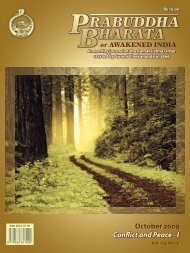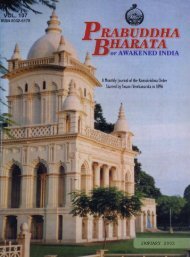October 2011 - Advaita Ashrama
October 2011 - Advaita Ashrama
October 2011 - Advaita Ashrama
You also want an ePaper? Increase the reach of your titles
YUMPU automatically turns print PDFs into web optimized ePapers that Google loves.
Bhakti<br />
Swami Durgananda<br />
Deep in everybody’s heart love is<br />
present, effortlessly sporting on its<br />
own. Love, when directed to God,<br />
is called bhakti. Bhakti is an ontological fact.<br />
It precedes everything, it is uncreated, ever-<br />
present, uncaused. The entire creation has come<br />
into being with bhakti as a substratum. Being<br />
a substratum, and hence subtle, bhakti is also<br />
power.1 Our real nature too is power.2 Thus,<br />
it follows that bhakti must be our real nature.<br />
Bhakti is spontaneous; no effort is required for<br />
our real nature to be. We must strive to reclaim<br />
that spontaneous state.<br />
Reclaiming Bhakti<br />
In our present state the forces of this hidden<br />
power of bhakti are directed towards the outer<br />
objects of the world in the form of kama, desire.3<br />
However, this kama can never be satisfied. As<br />
the Bhagavata states: ‘By satisfying desires, kama<br />
never gets quenched; on the contrary, it only<br />
becomes stronger, like fire fed by oil.’ 4 All our<br />
longing for bhoga, experience, that constant feeling<br />
of want and incompleteness, is actually the<br />
longing for Reality, which will not end until the<br />
ultimate state is reached. This longing is due to<br />
our faint unwavering memory, dhruvasmriti, of<br />
our own pristine perfection. We long for it since<br />
we remember it. When kama is recognized as<br />
bhakti wrongly directed and one starts performing<br />
sadhana, the impulses of desire are reversed<br />
and true love for God gradually emerges.<br />
The school of <strong>Advaita</strong> Vedanta holds that in<br />
the ultimate state there would be neither the individual<br />
experiencing an object, nor the object,<br />
626<br />
nor the experience itself. On the other hand,<br />
the schools of bhakti gladly maintain that the<br />
bhakta’s individuality remains in the final state<br />
of bhakti, since a complete merger of the individual<br />
in God precludes an experience between the<br />
lover and the Beloved. From the bhakta’s point<br />
of view, however, there is the constant attempt<br />
to surrender his or her individuality. This surrender<br />
is a cardinal principle as a means to manifest<br />
bhakti to its fullest.<br />
We have heard the expression: ‘existential<br />
hatred’; it denotes a person’s constant revulsion<br />
aimed at no particular external object. It<br />
is an intense aversion by itself; people who possess<br />
it hate everything. By inverting this expression<br />
we may coin another: ‘existential love’. This<br />
would mean love by itself, a person’s love without<br />
any known object. A person possessing this<br />
is a moon of love. Anyone who comes within<br />
the ambit of such a person receives unstinted,<br />
unbounded love. Bhakti may be likened to existential<br />
love.<br />
The word ‘bhakti’ is derived from the root<br />
bhaj, to serve; bhakti means service to the Lord.<br />
It is a loving attachment to God. Narada defines<br />
bhakti as ‘intense love for God’.5 Further,<br />
Narada states:<br />
It is also of the nature of immortality (3).<br />
By attaining [bhakti] a man becomes perfect,<br />
immortal, and satisfied forever (4).<br />
After obtaining that [bhakti] a devotee<br />
does not desire anything else, does not grieve,<br />
does not hate anything, does not enjoy anything<br />
else, and does not feel encouraged to do<br />
anything else (5).<br />
PB <strong>October</strong> <strong>2011</strong>

















